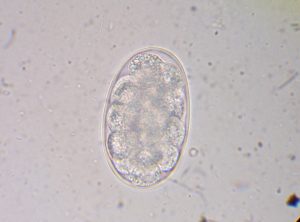 Necator americanus is a parasitic hookworm that infects the small intestine, causing hookworm disease, primarily in tropical and subtropical regions. Like Ancylostoma duodenale, the larvae of Necator americanus penetrate the skin, usually through contact with contaminated soil. The larvae then enter the bloodstream, travel to the lungs, and are eventually swallowed, maturing into adult worms in the intestines. Symptoms of Necator americanus infection include abdominal pain, fatigue, diarrhea, and iron deficiency anemia, which can lead to more severe health issues like growth delays and cognitive impairment in children.
Necator americanus is a parasitic hookworm that infects the small intestine, causing hookworm disease, primarily in tropical and subtropical regions. Like Ancylostoma duodenale, the larvae of Necator americanus penetrate the skin, usually through contact with contaminated soil. The larvae then enter the bloodstream, travel to the lungs, and are eventually swallowed, maturing into adult worms in the intestines. Symptoms of Necator americanus infection include abdominal pain, fatigue, diarrhea, and iron deficiency anemia, which can lead to more severe health issues like growth delays and cognitive impairment in children.
Eliminating Necator americanus involves antiparasitic treatment, typically with medications like albendazole or mebendazole. Clearing the parasite leads to a noticeable improvement in symptoms such as reduced anemia and better digestive health. Maintaining good hygiene practices, wearing shoes, and improving sanitation can help prevent future infections. By addressing this parasitic infection, individuals can experience better energy levels, improved cognitive function, and enhanced overall health, particularly in communities where the parasite is endemic.



